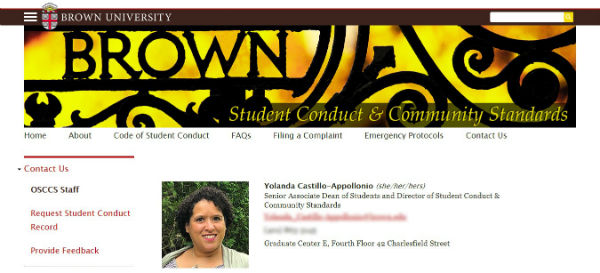
Threatened with vandalism charge after he tried to commit suicide
A black student athlete accused of sexual misconduct by a white student has painted “a picture of an ongoing, racially discriminatory pattern of conduct” in his Title IX proceeding, a federal judge ruled last month.
Brown University lost its motion to dismiss all claims by “John Doe,” meaning it’s going to face trial on allegations that it discriminated against him as both a man and a black person.
Two of John’s allegations about Brown’s attempts to get him off campus are particularly explosive.
It filed a complaint on behalf of a second woman who had actually told administrators her intimate encounter with John was consensual, and it later threatened to charge him with vandalism when he attempted suicide.
“Over the past fifteen months, this matter has been governed by three separate complaints and been subjected to two motions to dismiss,” U.S. District Judge John McConnell wrote in a memorandum and order. “The time has finally come for this case to go on to discovery and toward an ultimate resolution.”
The issue of race and Title IX has drawn limited attention in the media, but it could draw more if Brown doesn’t settle with John.
Journalist Emily Yoffe wrote about the phenomenon of black male students accused by non-black female students in The Atlantic a year ago. She contends black men are “vastly overrepresented in the cases I’ve tracked.”
It’s also the subject of advocacy by four feminist Harvard law professors: Elizabeth Bartholet, Jeannie Suk Gersen, Nancy Gertner and Janet Halley.
Three years after publicly criticizing Harvard for removing “the most basic elements of fairness and due process” from its revised sexual-misconduct policy in 2014, they asked the Department of Education to investigate “the disproportionate impact on racial minorities of discipline for campus sexual misconduct.”
Suk Gersen, Gertner and Halley did not respond to College Fix emails about the Brown ruling, and Bartholet said she didn’t know enough about the case to comment.
Accuser keeps violating protective order – but he must leave
The black student’s lawsuit claims he was “targeted because of his gender, race and racial stereotypes about black athletes.”
“Jane Doe,” a sorority sister a year ahead of him at Brown, was the aggressor in a romantic tryst gone wrong behind the bar where they met in September 2013. The white woman bit his lip, choked him and restrained him against the wall as he tried to leave, John alleged.
Brown charged him with “nonconsensual contact involving violence or intimidation” and underage drinking after Jane filed a complaint in December, but the university refused to act on his subsequent complaint against her, John said.
The proceeding against him was riddled with preferential treatment for his white accuser, according to McConnell’s summary of John’s claims.
The university let Jane amend her statement of allegations without giving it to the Student Conduct Board 24 hours ahead of time, giving John “no opportunity” to prepare a new defense. It prevented him from asking her about the changes; her new story was “inconsistent” with the original and what she had told friends.
Brown also let Jane apply “racist and/or misandristic” stereotypes to John and accuse his coach of “creating a misogynistic and hyper masculine environment,” while blocking him from asking questions about her alleged assault of him.
MORE: Black students claim rape was uncorroborated, witnesses threatened
He beat the “violence” charge but not the overall “nonconsensual sexual touching” or underage-drinking charges, and received a yearlong deferred suspension.
Jane repeatedly violated the protective order imposed against both of them and confidentiality rules even during the proceeding, telling others he was a “sexual predator” and showing up to John’s team parties, according to John.
Brown officials discriminated against him during the proceeding and the aftermath. He learned later that Maria Suarez, associate dean of student support and John’s “counselor,” was also serving accusers including Jane – a violation of Brown’s conflict-of-interest policy.
Yolanda Castillo-Appollonio (below), director of student conduct and community standards, also brushed off a complaint by John’s mother about Jane showing up to John’s events. She allegedly said “it is normally expected that the guy would leave the area.”

‘We got your boy now’ – and an accuser who never accused him
Suarez’s use of a term often considered a slur against black men convinced Judge McConnell that Brown must face a jury on John’s racial discrimination claim.
In May 2014, the university notified John that “Sally Roe” had accused him of sexual misconduct, and it barred him from campus immediately with no “pre-charge investigation.”
Suarez told him he would “pretty much” be found guilty and expelled unless he could prove he wasn’t with Sally. The day before, Suarez had told John’s coach “We got your boy now. He is out of here.”
Brown refused to explain the new charges to John’s parents over summer 2014, or even why it closed the investigation in August and let him return. His only memory of Sally was that they “made out” in a dorm bathroom the previous October.
Suarez again threatened to have John removed from campus after he attempted suicide following a “nonsexual encounter” with a woman. If he didn’t voluntarily leave, he would be charged with vandalism for throwing himself in front of a moving car and breaking the windshield.
MORE: Male student attempted suicide after Cornell double-jeopardy suspension
After Brown let him return for the 2015-2016 academic year, John learned from Sally that Jane had promised university officials she could produce another “victim” of John’s. That’s why Sally was called in by Dean Suarez and Vice President Margaret Klawunn and asked “leading questions”:
Brown officials generated the claim against John. Sally herself never felt anything “bad” happened between them and never filed a complaint. Sally apologized to John for the grief she had caused him.
Sally’s account is similar to that told in another Title IX lawsuit by a black athlete, Colorado State University-Pueblo’s Grant Neal, who eventually received a settlement. The university deemed his white sexual partner a rape victim, but she claimed their relationship was consensual.
Is Brown’s behavior ‘utterly intolerable in a civilized community’?
Judge McConnell dismissed part or all of five counts among John’s 12 counts against Brown, dropping some of them because they exceeded the statute of limitations.
Even though John faced two investigations, McConnell believes his pleaded facts “tell the tale of a singular ongoing and evolving interaction between John and Brown, motivated by discriminatory animus,” which put some of his claims within the statute of limitations:
The Court cannot ignore the direct link between the pre-limitations period conduct and the allegations that fall within the three·year anchor period. Any such distinction would be artificial and ignore why what happened happened. …
John continued to face discriminatory conditions after the first investigation ended, into the investigation of the Sally incident, and thus into the applicable statute of limitations period.
John’s racial-discrimination claim also remains within the statute of limitations because he alleged specific discriminatory actions during the first investigation, as well as Brown’s deliberate indifference to his white accuser’s violations and Suarez’s “boy” comment to John’s coach.
His claims of Brown’s continual preferential treatment of Jane, “if proven, could lead a jury to find that Brown was deliberately indifferent to known harassment so that its response to that harassment was unreasonable,” McConnell wrote.
“Because the decision to launch the second investigation, and the decision to separate [John from campus], were directly related to the first investigation, John plausibly alleges that those decisions were affected by his gender,” the judge continued.
MORE: If hearing panel can consider ‘1000 girls,’ why not 1,000 whites?
Brown also “fails to argue persuasively” why John’s selective enforcement claim can’t move forward, when the university investigated Jane’s purported complaint on behalf of Sally:
Both [John and Jane] brought complaints of sexual assault. Both complaints of sexual assault occurred, at most, within six months of each other. Brown investigated Jane’s complaint; it ignored John’s complaint.
John has “plausibly alleged intentional racial discrimination” by arguing the white women, Jane and Sally, could exercise their rights under Brown’s code of student conduct but he could not. “It is plausible that a jury could find” the dean’s use of “boy” showed racial hostility as well, McConnell wrote.
Even John’s claim for intentional infliction of emotional distress is moving forward. Rhode Island, where Brown is located, requires John to show the university’s behavior toward him was “utterly intolerable in a civilized community.”
Again, because the “boy” remark that suggested racial motivation for the second investigation could be considered reckless enough to drive John to self-harm, a jury could conclude it violates state law, McConnell said.
John’s claim that “Brown violated his procedural rights in ordering his interim separation [from campus] pending the outcome of the second Title IX investigation” is also moving to a jury. If John is correct, this was an “old complaint” and thus he showed no “immediate threat” on campus.
“We believe that Brown has a strong case to present to the court as this matter proceeds in the months ahead and we will respond through the legal process,” Brian Clark, director of news for Brown, told The Fix:
The decision narrows the scope of the case and appears to reflect the court’s interest in hearing the arguments of all parties, which is understandable given the national discussions regarding issues of sexual misconduct on college campuses.
Brown maintains it did nothing wrong, however. “Brown’s focus remains on ensuring a disciplinary process that balances our obligations to both complainants and respondents and is fundamentally fair to all members of the community,” Clark said.
MORE: Campus kangaroo courts target nonwhites, ‘nobody wants to talk about it’
IMAGE: WAYHOME studio/Shutterstock





Please join the conversation about our stories on Facebook, Twitter, Instagram, Reddit, MeWe, Rumble, Gab, Minds and Gettr.